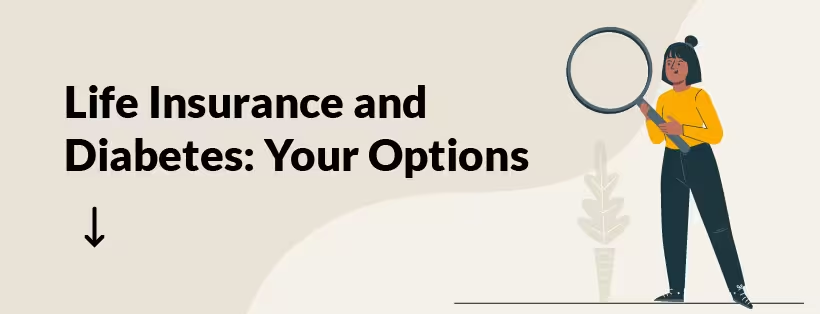Life insurance for people with diabetes
If you’ve just found out you have diabetes or have been living with the condition for years, you will generally still be able to buy life insurance. This guide covers what you need to know about the impact of a diabetes diagnosis on applying for life insurance.
Life insurance and diabetes
Life insurance if you have diabetes is no different from standard life insurance in that it will protect your family or other loved ones financially if you die during the term of the policy. Your beneficiaries would receive a lump sum that can be used to pay off your mortgage, credit cards or other outstanding debts, or to cover your funeral, daily household bills or childcare costs.
Here’s a quick overview of the main points of our guide to life insurance for people with diabetes:
- If you have type 1 or type 2 diabetes or other rarer forms of the illness, insurers will treat it as a pre-existing illness. You may still be eligible for life insurance but the application process may take longer and you’ll likely pay higher premiums.
- You will need to supply medical records, including recent results of a blood-glucose (sugar) test and the date your diabetes was diagnosed.
- Insurers will want to know about any complications you have as a result of your diabetes such as coronary heart disease and stroke.
- How well you manage your symptoms will affect the premiums you’ll pay. So insurers will ask about lifestyle changes, such as giving up smoking or alcohol, improving your diet, losing weight and walking or exercising more.
Compare life insurers: Our expert review of the UK’s best life insurance providers
If you have diabetes, you can still be eligible for life insurance. In fact, several of the UK’s leading insurance companies offer specialist cover for type 1 and type 2 diabetes. Insurers that don’t offer specialist cover may also provide a quote, although premiums are likely to be higher.
But as diabetes is considered a pre-existing health condition, you’ll need to supply medical evidence to potential insurers, including results of a recent blood-glucose test and details about your lifestyle choices – whether you are a smoker and your weight, for instance.
Due to the long-term nature of type 1 diabetes, potential complications and shorter life expectancy, your application could be turned down. Asking why you have been refused cover could help you to decide whether to approach other life insurance providers.
Type 1 diabetes, which occurs more often in children and young adults, comes on fairly quickly. It is an autoimmune condition where the body doesn’t produce enough of the hormone, insulin. This affects the amount of glucose (sugar) your body produces, which is needed for energy. Without insulin, the glucose in the blood is abnormally high.
While there is no cure, type 1 diabetes can be managed by taking insulin via injections or pump, monitoring blood-glucose levels, managing your diet and adjusting insulin doses when necessary.
People living with type 1 diabetes generally have it from a young age, so while their condition can be managed, a long-term or lifelong diagnosis means that there is more time to develop potential health complications. Life insurers will want to factor in this higher risk of someone developing health conditions.
You should apply for life insurance for type 1 diabetes through a specialist insurance broker or financial adviser – it’s too complex to buy via a comparison site or direct from insurers. It may take longer to arrange because of the medical information you’ll need – and your life insurance premiums are likely to be higher.
Type 2 diabetes starts more gradually and affects adults. Unlike type 1, blood-glucose levels in type 2 diabetes can be lowered through lifestyle changes, such as reducing alcohol consumption or a healthy diet and exercise, which may avoid the need for medication and even reverse the condition.
Being overweight, smoking and drinking alcohol can increase your chances of developing diabetes, while high blood pressure is a risk factor that needs to be monitored.
From a life insurance perspective, type 2 diabetes presents less of a risk because it can be more easily managed and potentially reversed. Because more people develop type 2 as an adult, complications have less time to develop. This means that you can apply directly and – if you have had no complications – be offered insurance right away, making monthly premiums more affordable.
What about other types of diabetes?
According to charity Diabetes UK, type 2 is the most common form of diabetes, affecting about 90% of people in the UK, followed by type 1 diabetes at 8% of the population. Other rarer types of diabetes make up the remaining 2%, which include:
Can you get life insurance if you have pre-diabetes?
It is possible to have a blood-glucose level that is higher than it should be, but not high enough to be classed as type 2 diabetes. Pre-diabetes gives you a window of opportunity to make lifestyle changes to decrease your blood sugar to normal levels.
Insurers will treat pre-diabetes much in the same way as type 2 diabetes, looking at recent blood-glucose readings, weight, blood pressure and other illnesses you have, as well as lifestyle changes you are currently making. While you should still be able to get life insurance with pre-diabetes you will find that your premiums are slightly more expensive.

Part of the process of applying for life insurance when you have diabetes is choosing the right type of insurance for your financial circumstances. These are:
Term life insurance
This provides cover for a set period or ‘term’, with several options under the term life umbrella:
- Level term insurance: the cover remains the same throughout the policy.
- Decreasing life insurance or mortgage life insurance: the payout decreases over the length of the policy.
- Increasing term insurance: premiums and payouts increase as the policy progresses.
- Family income benefit: this provides beneficiaries with a regular payment rather than a lump sum.
Whole of life insurance
As the name suggests, whole of life cover will last your entire life, providing a guaranteed lump sum to your beneficiaries on your death.
Over-50s life insurance
There are fewer medical hoops to jump through with over-50s life cover because insurers will accept people in this age group with pre-existing medical conditions, and you won’t need to disclose your medical history. This type of cover provides a guaranteed tax-free payout when you die, with the certainty of fixed premiums.
To find out more about the different types of life cover, read our article on popular types of life insurance.
A diabetes diagnosis is quite complex for insurers to unpack, so gathering the medical records you’ll need for your life insurance application in advance can prevent delays further down the line.
Listed below are questions you might be expected to answer; some depending on the type of diabetes (the list is not exhaustive):
- What type of diabetes do you have?
- When were you first diagnosed?
- Have you had a diabetic review within the last year?
- Do you take insulin injections or use an insulin pump?
- Do you take other medication for your diabetes?
- Have you had any diabetes-related hospital admissions in the past three years?
- Do you have any upcoming hospital referrals other than for routine checkups?
- What is your body mass index (BMI)?
- Can you provide your latest HbA1c test (to check blood-sugar levels in red blood cells)?
- Have you had any complications?
- Have you experienced loss of sensation in your toes, feet or fingers?
- Do you have high blood pressure or high cholesterol?
- What are you doing to manage your diabetes?
Always answer questions that life insurance companies ask honestly and accurately. Failure to do so could invalidate any claim.
Can people with diabetes be refused life cover?
Unfortunately, an insurer might reject your application. However, the criteria that insurers use vary, which is why a specialist insurance broker can advise on the best insurers for your specific health conditions. For example, your application for life cover might be rejected if:
- you are overweight with a high BMI (body mass index)
- you have only recently been diagnosed with diabetes
- you have any pending hospital referrals or admissions
- you have cardiovascular conditions, such as angina, stroke or raised blood pressure and cholesterol
- a recent HbA1c blood test of your blood-glucose levels is higher than normal.
Sometimes insurers may ask for more information from your GP on some of these risk factors, or for a medical examination, before making a final decision.
What other types of insurance can I consider with diabetes?
Life insurance will give you peace of mind that your loved ones will be financially secure in the event of your death, but also consider critical illness insurance and income protection that you could benefit from during your lifetime.
While it is easier to take out these policies with type 2 diabetes, some insurers will also cover type 1, although your options will be limited to specialist providers. Criteria will vary but can include having no hospital admissions for diabetes over a set period, results of your last diabetes review, and keeping your BMI below a certain level. Insurers won’t cover the diabetes itself as it is a pre-existing medical condition.
Critical illness cover
This will provide a tax-free lump sum payment if you develop a critical illness listed in your policy. It can cover a wide range of critical illnesses, such as stroke, heart attack, kidney failure and dementia. Life and critical illness insurance complement each other, so consider taking them out at the same time.
Income protection
Income protection will provide a regular income if you are unable to work because of an illness or injury. Insurers will pay out until you are well enough to return to work or your policy ends.
How to get life insurance for diabetes
As you can see, having diabetes doesn’t mean you can’t get life insurance cover, but it may involve taking a few extra steps compared with a standard application.
Your options may be more limited, so seeking the help of life insurance experts is a good starting point. Fill out our form so we can connect you with an insurance broker who can discuss your life insurance requirements and provide expert help.
What our readers say
We are rated Excellent on Google from 150+ reviews. Our reviews relate to the service provided by both myTribe and its partners.
Disclaimer: This information is general, and what is best for you will depend on your personal circumstances. Please speak with a financial adviser or do your own research before making a decision. Not all of our insurer broker partners offer an advised service. The brokers we work with provide a comparison service from a panel of some of the UK’s top insurers, such as Aviva, L&G, LV and Zurich. Not every broker works with all the insurers listed in our guides.
Frequently Asked Questions
Will my policy be valid if I develop diabetes after I’ve taken out a life insurance policy?
Yes. As you didn’t have diabetes when you first took out the policy, you will be insured and will continue to pay the same premiums. But if you apply to renew your policy when the term ends, your diabetes will then be taken into account and premiums are likely to increase.
What if my diabetes gets worse after I’ve taken out life cover?
Life insurance is based on your health when you sign up, so you only need to tell your insurer if you plan to increase or renew your cover. But if you have a policy where premiums are not guaranteed, then you should tell the insurer about your worsening health.
Does life insurance cover diabetes?
Yes. Insurers generally will pay your beneficiaries on a death directly related to diabetes or its complications.










